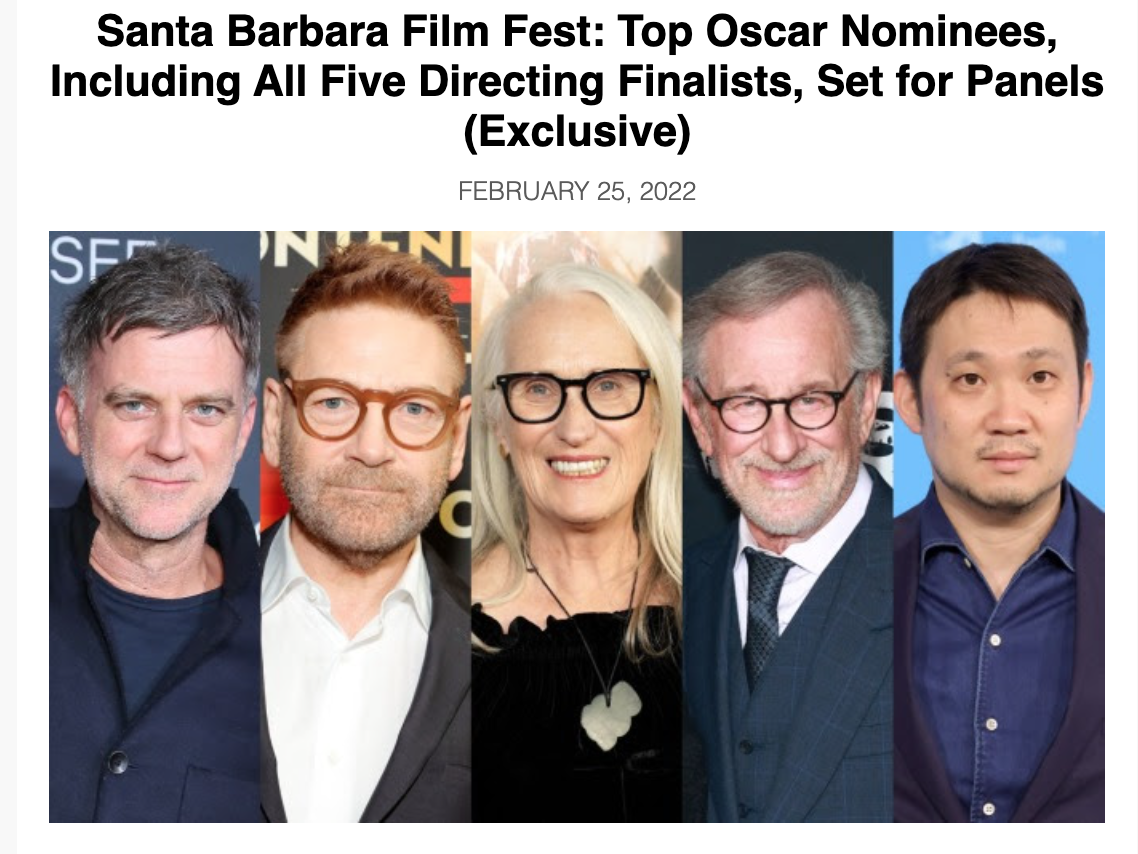On the evening of Thursday, March 3rd, the Santa Barbara Film Festival will present an on-stage interview with the five 2022 nominees for the 2022 Best Director Oscar — The Power of the Dog‘s Jane Campion, Drive My Car‘s Ryusuke Hamaguchi, Licorice Pizza‘s Paul Thomas Anderson, Belfast‘s Kenneth Branagh and West Side Story‘s Steven Spielberg.
The Hollywood Reporter‘s Scott Feinberg, always the gentle diplomat, will moderate the group interview on the stage of Santa Barbara’s Arlington Theatre. Here are some suggested questions that Feinberg might want to consider asking….hah!
Spielberg question #1: Leaving aside the Covid diminishment factor, what were your commercial expectations or hopes for West Side Story before it opened? Did you think it might appeal to Millennials and Zoomers and GenXers, or just boomers? Put another way, what led you to remake a famous 1961 musical that everyone’s seen and which won a ton of Oscars 60 years ago? You obviously did a beautiful job of re-energizing the material and all the critics loved it, but younger audiences totally blew it off. Thoughts?

Spielberg question #2: You’ve been working fairly steadily with cinematographer Janusz Kaminski for a quarter century now — The Lost World: Jurassic Park, Saving Private Ryan, A.I. Artificial Intelligence, Minority Report, Catch Me If You Can, The Terminal, War of the Worlds, The Adventures of Tintin, Lincoln, Bridge of Spies, The Post, Ready Player One, West Side Story and the upcoming The Fabelmans. And a majority of these films bear Kaminski’s famous visual trademark — subdued, grayish colors with a milky, semi-hazy lighting scheme. If you could be magically transported back to the ’70s and early ’80s and had the chance to re-shoot your classic films from that era — Duel, Jaws, Close Encounters, Raiders of the Lost Ark, E.T. — would you bring Janusz along so he could give the subdued grayish-milky treatment to those films also?
Campion question: We all know that you’re locked to win the Best Director Oscar. The message has gone out that it’s your time, and that we need another woman to win, and that Netflix will finally have a major Oscar to its credit. And there’s no question that The Power of the Dog is very well made and exquisitely finessed. But these two factors aside, what was it that convinced you that a grim story about a toxic closet case and a belligerent asshole in 1920s Montana…a story of this macho dickhead making life miserable for his brother’s wife and how her gay son has his revenge…what was it about this story that told you “this…this is a story about closeted sexuality that needs to be told…this is a story that 2021 audiences are hungry to see!”
Branagh question: You’ve made a film about the struggles of a Protestant Belfast family during “the troubles”, but without really explaining what the troubles were about or indicating what your personal views are (or were) about the occupation of northern Ireland by British troops, and what the Catholics were fighting for, and whether or not the whole Protestant, anti-Catholic thing had merit or not. Since you didn’t get into it in your film, would you care to discuss it now?
Anderson question: As you know, for the last four or five years the Hollywood wokester cabal has dictated that all historical films have to adopt the practice of presentism in terms of casting. That means that all casts have to reflect social values as they should be in terms of inclusion and representation rather than how they actually were during the time of the story.** (Presentism anticipates the Academy’s representation and inclusion standards that will apply concurrent with the 2024 Oscars.) Late last year you were challenged on a racial insensitivity issue because Licorice Pizza has a couple of scenes in which a middle-aged white guy speaks to his Japanese wife (actually two wives in succession) with a bizarre Japanese accent. You responded that you think it’s more important to portray all the aspects of a given era accurately rather than default to presentism in a kneejerk way. Would you care to elaborate on this dispute and re-explain where you were coming from?
** This is known in some circles as “the Jen Yamato edict.”









